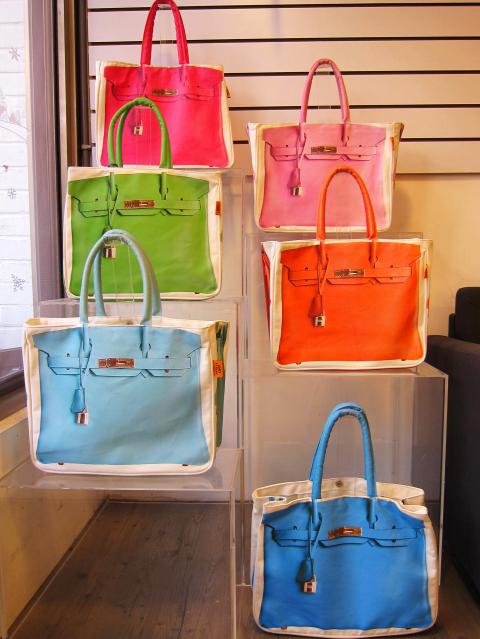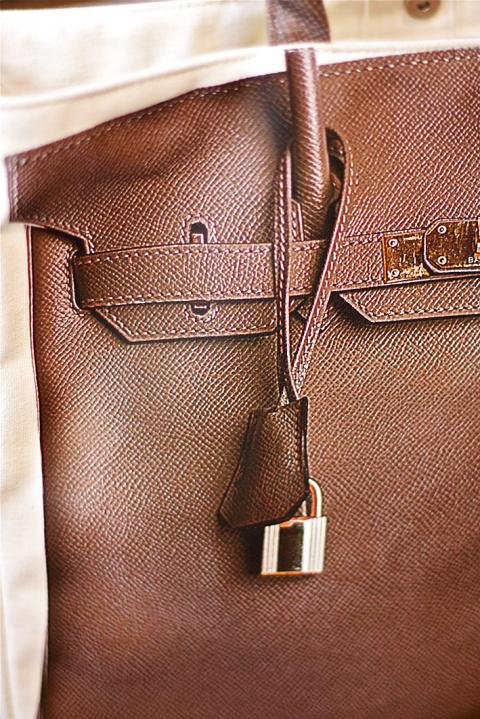The Banane Taipei started as a sassy take on the craze for designer bags, but over the past nine months, the NT$1,480 canvas tote has garnered its own celebrity following, cult status and a waiting list.
Printed with an image of a satchel that resembles the Hermes Birkin bag, the Banane Taipei seems to parody status bags. Its creators insist, however, that it is meant as an affectionate tribute. The tote was created as the first product of Banana International (嬌蕉國際), a fledgling lifestyle brand that plans to manufacture all its products in small Taiwanese factories.
“We’re honoring a classic while promoting the idea of environmental responsibility,” says Chu Yun-kuang (朱韻光), marketing director for the Banane Taipei. The four sides of the bag, which was created as a reusable shopping tote, are printed with images of a leather satchel to create a trompe l’oeil effect. (While the satchel resembles a Hermes Birkin, Chu says it is actually a photo composite of other bags and leather textures.) The result is an image so realistic that you want to reach out and touch the gold buckle to make sure it isn’t three-dimensional.

Photo: Catherine Shu, Taipei Times and Courtesy of Banana International
After its release in April, the Banane Taipei quickly gained in popularity when paparazzi photographed talk show host Dee Hsu (徐熙娣, aka Little S) carrying an orange version. Mentions on English-language style blogs helped it gain an international customer base. At its peak, the bag’s waiting list was four months. A sale at the company’s office in Da-an District last month resulted in a long line snaking out the door; Chu estimates that 200 customers came to purchase bags.
The Banane Taipei joined a cluster of inexpensive cotton totes that pay tribute to (or parody, depending on who you ask) designer bags. Before the Banane Taipei was released, Japanese brand TATA Baby came out with a purse shaped like the Hermes Birkin, but sewn entirely from printed canvas. Spanish indie designer nosideup (www.etsy.com/shop/nosideup) has sold bags with black-and-white drawings of bags by various designers since 2009. And last month New York City brand Thursday Friday (www.thufri.com) came out with a tote, the Together Bag, whose near-exact similarity to the Banane Taipei was noted by readers on several fashion sites, including the New York Times T Magazine blog (tmagazine.blogs.nytimes.com).
(In an e-mail, a Thursday Friday spokeswoman said, “Our concept goes beyond the specific iteration of this one model on a canvas tote. Thursday Friday is about satire, fashion and surrealism.” Banana International’s take on the Together Bag is that the company supports “all kinds of creativity.” Hermes did not respond to a request for comment.)

Photo: Catherine Shu, Taipei Times and Courtesy of Banana International
In its previous incarnation, Banana International was T-shirt brand Extension 8 (八號分機), which was founded in 2001 and best known for designing the Taiwan Beer basketball team’s (台灣啤酒籃球隊) jerseys. Early last year, the Extension 8 design team decided that Taiwan’s graphic T-shirt market was becoming oversaturated and began looking for a new focus.
“We decided to concentrate on creating environmentally friendly products while using our previous marketing experience to promote Taiwanese industries,” Chu says. The company’s new name honors the fruit that was once one of Taiwan’s most important agricultural imports.
The current waiting time for a Banane Taipei is about a month, but Chu says that the company is not purposely trying to make the bag hard to get. The Banane Taipei is produced at small factories in New Taipei City and Greater Taichung. Quality control inspectors are told to make sure all lines of stitching are unbroken and that there are no flecks or smudges in the printing. Chu says that Banana International’s main goal is to ensure that customers develop a positive image of its domestically manufactured products so that they can compete with imports. “We really want people to think highly of MIT [made in Taiwan] products,” Chu says. “We want them to feel they are getting something special.”
>> On the Net: www.bananataipei.com

The canonical shot of an East Asian city is a night skyline studded with towering apartment and office buildings, bright with neon and plastic signage, a landscape of energy and modernity. Another classic image is the same city seen from above, in which identical apartment towers march across the city, spilling out over nearby geography, like stylized soldiers colonizing new territory in a board game. Densely populated dynamic conurbations of money, technological innovation and convenience, it is hard to see the cities of East Asia as what they truly are: necropolises. Why is this? The East Asian development model, with

June 16 to June 22 The following flyer appeared on the streets of Hsinchu on June 12, 1895: “Taipei has already fallen to the Japanese barbarians, who have brought great misery to our land and people. We heard that the Japanese occupiers will tax our gardens, our houses, our bodies, and even our chickens, dogs, cows and pigs. They wear their hair wild, carve their teeth, tattoo their foreheads, wear strange clothes and speak a strange language. How can we be ruled by such people?” Posted by civilian militia leader Wu Tang-hsing (吳湯興), it was a call to arms to retake

Desperate dads meet in car parks to exchange packets; exhausted parents slip it into their kids’ drinks; families wait months for prescriptions buy it “off label.” But is it worth the risk? “The first time I gave him a gummy, I thought, ‘Oh my God, have I killed him?’ He just passed out in front of the TV. That never happens.” Jen remembers giving her son, David, six, melatonin to help him sleep. She got them from a friend, a pediatrician who gave them to her own child. “It was sort of hilarious. She had half a tub of gummies,

The wide-screen spectacle of Formula One gets a gleaming, rip-roaring workout in Joseph Kosinski’s F1, a fine-tuned machine of a movie that, in its most riveting racing scenes, approaches a kind of high-speed splendor. Kosinski, who last endeavored to put moviegoers in the seat of a fighter jet in Top Gun: Maverick, has moved to the open cockpits of Formula One with much the same affection, if not outright need, for speed. A lot of the same team is back. Jerry Bruckheimer produces. Ehren Kruger, a co-writer on Maverick, takes sole credit here. Hans Zimmer, a co-composer previously, supplies the thumping